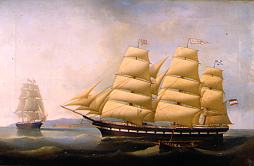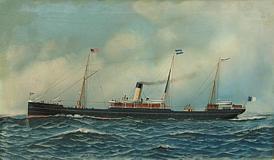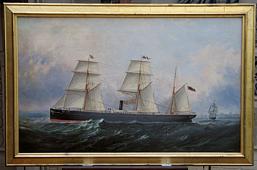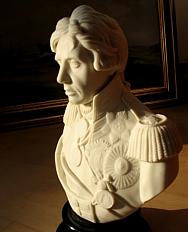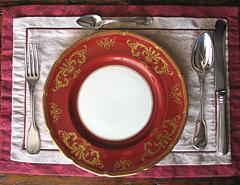|
Private Collections of Ship Portraits and Maritime Antiques
(click on photo to enter)
|
|
The Werder Collection has been formed by an enthusiastic and
very active collector in Germany within the previous 30 years. It represents
- more than other collections of this kind - the typical ship portraits
which have been brought home by German Captains coming from the ports
of the Nortern and Baltic Sea. The sail or steam vesseln shown
on the paintings visited many harbors around the world and we find in
this collection all kind of European, American and (mostly unknown)
Chinese Artists from the 19th Century. Especially well represented are
in this collection paintings by the older and younger Petersen (sometimes
in co-operation with Holm) and works by John Henry Mohrmann, who often
received commissions by German Captains. These ship portraits are only
locally available for viewing to the public and this presentation is
a good way to see images of all these paintings. Click on photo to
enter.
|
|
The Oporto Collection belongs to an ambitious collector in the
old Harbour Town of Porto, Portugal. Being himself in leading
position in the Portuguese and International Trade the owner likes especially
paintings and half models of the old steamers which were used in the
second half of the 19th Century and in the beginning of the 20th Century
until the 1920s. It is also of meaning to the collector that the painter
is not only locally known, but internationally recognized as a good
ship portrait or marine artist. A recent addition to the collection
was the magnificent painting of the "Peninsular" by the leading
steam ship portraitist of the world - Antonio Jacobsen - see photo right
and the description below. We will update this page with more additions
in the future. These items are not available for viewing to the public
and this presentation is the first and only way to see images of these
paintings. Click on photo to enter.
|
|
The Baltic Sea Collection belongs to a passionate collector in
the old Harbour Town of Lubecka , Germany. This town was once the head
of the famous HANSE group of merchant towns. The concept of the
collection is to hold at least one painting from the more important
Ship Portrait Artists in the 19th Century around the world. Furthermore
great attention is given to the history of the vessel and painting.
Therefore a huge library of specialized literature about marine art
& paintings, ship lists, ship building, maritime trade, the history
of shipping companies and related matters has been build up. These are
about 2000 books which are used to research the vessels shown on the
paintings. From most of the painted ships the history has been researched
in great detail, in some cases even several pages of text has been written.
A recent addition to the collection was a magnificent portrait of a
large Russian Sail-and-Steam ship painted by John Scott 1867 in Tynemouth.
We will update this page with more additions in the future. These items
are not available for viewing to the public and this presentation is
the first and only way to see images of these paintings. Click on
photo to enter.
|
|
Browse here a collection and gallery of Marine / Maritime &
Nautical Antiques, held in Private Collections around the world.
For example see right a Copeland Parian Porcelain Bust of Admiral
Horatio Nelson, England ca. 1865 – showing the British Sea Hero with
the honor medal "Nile, 1. August 1798", made of parian porcelain
(finely executed) on a wooden socket. It is 12 1/2 inch (32 cm) cm
high and signed/impressed with the mark of Copeland on reverse - this
item is displayed in a Maritime Museum Collection USA.
The Maritime Museum in Greenwich has
some of these busts in their collections as well. We will update
this page with more additions in the future. |
|
Browse here a gallery of fine solid Silverware (Tableware &
Flatware), held in Private Collections around the world, including
old Sterling Silver. For example see right an antique Fiddle &
Thread Flatware Set for six Persons, Switzerland around 1890. This
Pattern came up in France during the 18th Century and in the 19th
Century it became the most popular Flatware Design in the Old World.
Today this Design represents the typical Classic and Elegant Flatware
in Continental Europe. We will update this page with more additions
in the future. |

